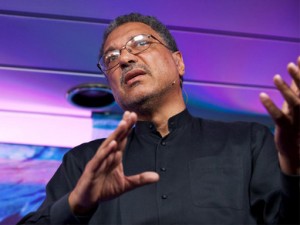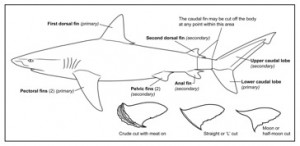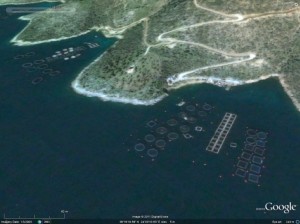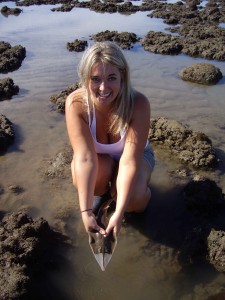 Daniel Pauly’s TED talk on Shifting Baselines is finally up! Watch the video, or read the transcript below:
Daniel Pauly’s TED talk on Shifting Baselines is finally up! Watch the video, or read the transcript below:
I’m going to speak about a tiny, little idea. And this is about shifting baseline. And because the idea can be explained in one minute, I will tell you three stories before to fill in the time. And the first story is about Charles Darwin, one of my heroes. And he was here, as you well know, in ’35. And you’d think he was chasing finches, but he wasn’t. He was actually collecting fish. And he described one of them as very “common.” This was the sailfin grouper. A big fishery was run on it until the ’80s. Now the fish is on the IUCN Red List. Now this story, we have heard it lots of times on Galapagos and other places, so there is nothing particular about it. But the point is, we still come to Galapagos. We still think it is pristine. The brochures still say it is untouched. So what happens here?
The second story, also to illustrate another concept, is called shifting waistline. (Laughter) Because I was there in ’71, studying a lagoon in West Africa. I was there because I grew up in Europe and I wanted later to work in Africa. And I thought I could blend in. And I got a big sunburn, and I was convinced that I was really not from there. This was my first sunburn.
And the lagoon was surrounded by palm trees, as you can see, and a few mangrove. And it had tilapia about 20 centimeters, a species of tilapia called blackchin tilapia. And the fisheries for this tilapia sustained lots of fish and they had a good time and they earned more than average in Ghana. When I went there 27 years later, the fish had shrunk to half of their size. They were maturing at five centimeters. They had been pushed genetically. There were still fishes. They were still kind of happy. And the fish also were happy to be there. So nothing has changed, but everything has changed.
My third little story is that I was an accomplice in the introduction of trawling in Southeast Asia. In the ’70s — well, beginning in the ’60s — Europe did lots of development projects. Fish development meant imposing on countries that had already 100,000 fishers to impose on them industrial fishing. And this boat, quite ugly, is called the Mutiara 4. And I went sailing on it, and we did surveys throughout the southern South China sea and especially the Java Sea. And what we caught, we didn’t have words for it. What we caught, I know now, is the bottom of the sea. And 90 percent of our catch were sponges, other animals that are fixed on the bottom. And actually most of the fish, they are a little spot on the debris, the piles of debris, were coral reef fish. Essentially the bottom of the sea came onto the deck and then was thrown down.
And these pictures are extraordinary because this transition is very rapid. Within a year, you do a survey and then commercial fishing begins. The bottom is transformed from, in this case, a hard bottom or soft coral into a muddy mess. This is a dead turtle. They were not eaten, they were thrown away because they were dead. And one time we caught a live one. It was not drowned yet. And then they wanted to kill it because it was good to eat. This mountain of debris is actually collected by fishers every time they go into an area that’s never been fished. But it’s not documented.
We transform the world, but we don’t remember it. We adjust our baseline to the new level, and we don’t recall what was there. If you generalize this, something like this happens. You have on the y axis some good thing: biodiversity, numbers of orca, the greenness of your country, the water supply. And over time it changes — it changes because people do things, or naturally. Every generation will use the images that they got at the beginning of their conscious lives as a standard and will extrapolate forward. And the difference then, they perceive as a loss. But they don’t perceive what happened before as a loss. You can have a succession of changes. At the end you want to sustain miserable leftovers. And that, to a large extent, is what we want to do now. We want to sustain things that are gone or things that are not the way they were.
Now one should think this problem affected people certainly when in predatory societies, they killed animals and they didn’t know they had done so after a few generations. Because, obviously, an animal that is very abundant, before it gets extinct, it becomes rare. So you don’t lose abundant animals. You always lose rare animals. And therefore they’re not perceived as a big loss. Over time, we concentrate on large animals, and in a sea that means the big fish. They become rarer because we fish them. Over time we have a few fish left and we think this is the baseline.
And the question is, why do people accept this? Well because they don’t know that it was different. And in fact, lots of people, scientists, will contest that it was really different. And they will contest this because the evidence presented in an earlier mode is not in the way they would like the evidence presented. For example, the anecdote that some present, as Captain so-and-so observed lots of fish in this area cannot be used or is usually not utilized by fishery scientists, because it’s not “scientific.” So you have a situation where people don’t know the past, even though we live in literate societies, because they don’t trust the sources of the past.
And hence, the enormous role that a marine protected area can play. Because with marine protected areas, we actually recreate the past. We recreate the past that people cannot conceive because the baseline has shifted and is extremely low. That is for people who can see a marine protected area and who can benefit from the insight that it provides, which enables them to reset their baseline.
How about the people who can’t do that because they have no access — the people in the Midwest for example? There I think that the arts and film can perhaps fill the gap, and simulation. This is a simulation of Chesapeake Bay. There were gray whales in Chesapeake Bay a long time ago — 500 years ago. And you will have noticed that the hues and tones are like “Avatar.” (Laughter) And if you think about “Avatar,” if you think of why people were so touched by it — never mind the Pocahontas story — why so touched by the imagery? Because it evokes something that in a sense has been lost. And so my recommendation, it’s the only one I will provide, is for Cameron to do “Avatar II” underwater.
Thank you very much.





